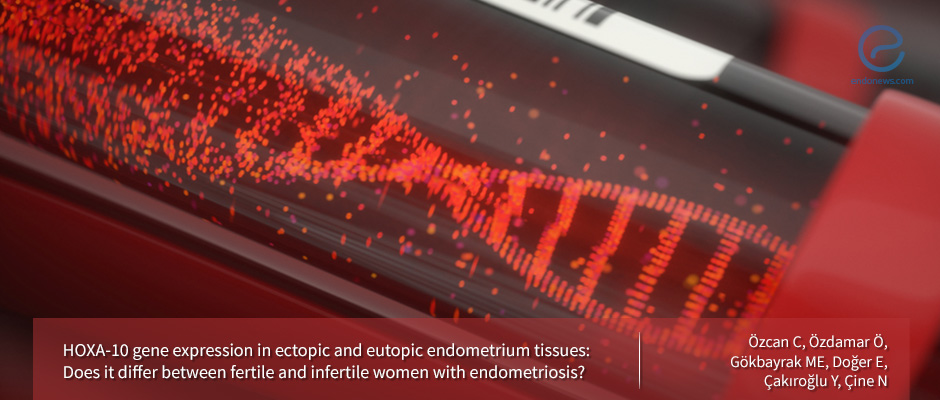HOXA-10 levels are related to infertility in endometriosis patients
Feb 7, 2019
Low expression of HOXA-10 gene was observed in infertile women with endometriosis
Key Points
Highlights:
- Decreased expression of HOXA-10 gene may, directly or indirectly, be related to the endometriosis-associated infertility
- The severity of endometriosis correlates with the significant decrease in HOXA-10 gene expression
Importance:
- This study is in agreement with past expression profiling studies that show HOXA-10 as one of the differentially methylated genes in normal endometrium versus endometriotic lesions
- HOXA-10 is associated with embryo implantation process, hence its levels are highly relevant for infertility studies aiming to understand the underlying mechanisms of endometriosis-associated infertility
What’s done here?
- Endometrial samples from 3 groups of women [11 women without infertility or pelvic pain symptoms (control group), 11 fertile and 11 infertile women who underwent endometrioma surgery] were collected and tested for HOXA-10 gene expression
Key results:
- Significant downregulation of HOXA-10 gene in women with endometriosis than in those without endometriosis; the levels are lower in severe cases compared to moderate ones
- Endometriosis patients with infertility show significantly lower levels of endometrial HOXA-10 gene expression compared to endometriosis patients without infertility
Limitations of the study:
- Lack of evaluation of the protein product of the HOXA-10 gene. The protein levels may remain the same even though the RNA levels (tested here) are decreased
- The control group (no endometriosis) were selected based on the absence of clinical or sonographic findings of endometriosis, but no laparoscopic observations were performed
- Lack of endometrial dating through pathologic examination to ensure the samples were collected during the implantation window. Sample collection was done between the 18th and 24th day of menstrual cycle, which is presumed to be the secretory phase
- Relatively small sample size
Lay Summary
The current study by Ozcan et al., published in the European Journal of Obstetrics & Gynecology and Reproductive Biology aimed to investigate the levels of HOXA-10 gene in fertile versus infertile women with endometriosis.
HOXA-10 protein (expressed by HOXA-10 gene) is normally elevated in human endometrium during implantation and its levels increase dramatically during the mid-secretory phase of the menstrual cycle, which roughly corresponds to Day18 to Day25 of a normal menstrual cycle.
According to the present study, the HOXA-10 levels in patients with endometriosis were lower during the mid-secretory phase when compared to the control group without endometriosis. Furthermore, the severity of the endometriosis correlated with how low the HOXA-10 expression was. Similarly, lower levels of HOXA-10 was found in infertile women in comparison to fertile women, both with endometriosis. Since HOXA-10 is involved in embryo implantation, the results suggested infertility of women with endometriosis might be caused by a decrease in the implantation due to lower HOXA-10 levels.
This study is in agreement with previous ones:
- Mice lacking HOXA-10 gene were severely infertile and had abnormal reproductive systems; indicating a role for HOXA-10 in the fertility,
- HOXA-10 gene was expressed in different amounts in normal endometrium versus endometriotic lesions; indicating a linkage between HOXA-10 gene and endometriosis.
The investigation of HOXA-10 expression in fertile versus infertile women as well as in women with severe versus moderate endometriosis certainly reveals some insights into the underlying mechanism of infertility in women with endometriosis. Further studies are warranted to evaluate whether any of the treatment strategies such as endometriosis surgery improves the fertility outcomes and recovers HOXA-10 gene expression.
Research Source: https://www.ncbi.nlm.nih.gov/pubmed/30562617
HOXA-10 implantation mid-secretory phase infertility

